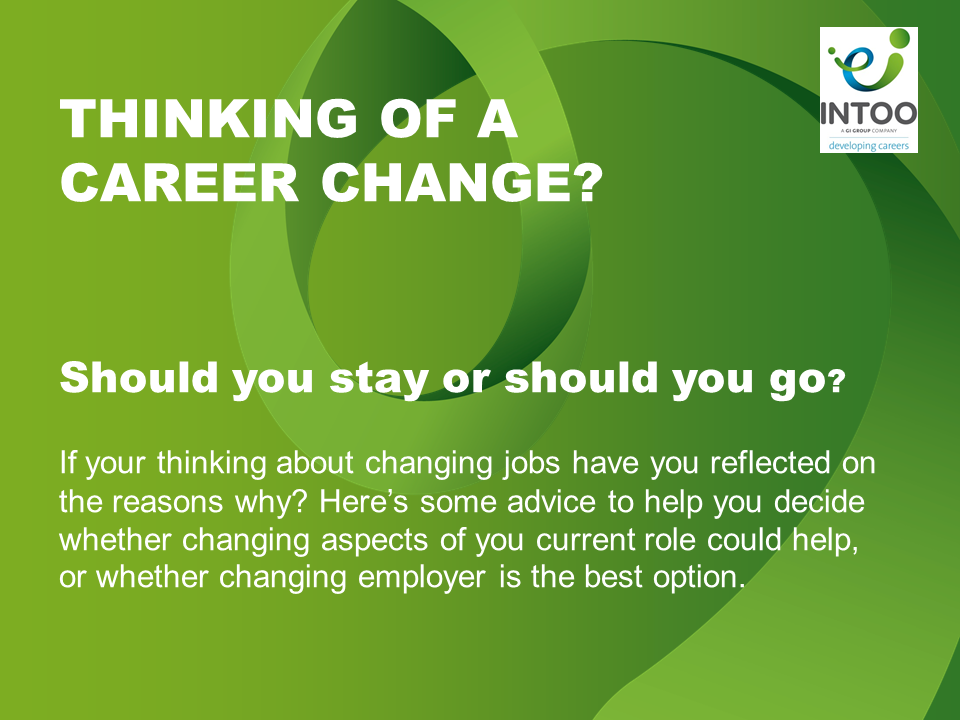If you find yourself, like many others at this time of year, thinking about the future and what you want to achieve, most notably in relation to your career, you’re not alone. Despite the uncertainty of Brexit and other global events, up to 30% of employees are estimated to be considering changing careers in early 2017.
But before taking the plunge and handing in your notice, take a moment to reflect and consider whether this is really the best course of action? As always, there are different ways of looking at things, but you may find that a move away from your current employer is unnecessary.
A common mistake made by many people, often a result of passive career management) is failing to appreciate what is really driving their desire to seek different employment. Without this knowledge the reality is that the chances of successfully finding a more fulfiling role elsewhere much reduced.
Drivers for changing jobs
People move jobs for a variety of reasons: more money, increased development opportunities, a better life balance, more challenge or less of a commute. Realising what these drivers are is essential to create a better, happier future. Equally, heading into the unknown without really identifying the personal motivation to move on will lead to further reflection next Christmas, and a determined approach to ‘move on’ again, and again, and again……..
So if you find yourself in this positioning, how can you assess whether you should stay or go?
Think clearly about what you really want
Both from your current role and for your career in the long term. Understanding your motivations will help you make informed decisions. If you need to discuss this with anyone, by all means discuss it with family and friends, but remember, they won’t always offer truly objective advice, so consider asking your line manager of HR department if any career coaching support could be provided.
Analyse the ‘push-pull’ comparative
What is driving your thinking? Are you looking to move away from (the push) e.g. a stressful environment, a poor relationship with a colleague or a lack of faith with the organisation’s values and culture? Or is it a more positive one where e.g. better career progression (a more proactive and interventionist driver – the ‘pull’).
Address the push factors
Unless the psychological contract is irrevocably damaged, think about speaking to your manager about your thought process. The likelihood is that they are unaware and will look for ways to address these factors, and retain you.
Explore career devlopment with your current employer
If you like the organisation, press you manager for a ‘career conversation’. Many individuals leave their roles and not the organisation, often citing the reason for moving on was to ‘develop their career’. Meanwhile, the organisation is left ruing the loss of a talented employee that they had earmarked for further progression……….don’t jump ship without giving it a go.
Ask for a secondment
Perhaps your next career move requires greater financial knowledge or an insight into marketing activities. Network around the business. Speak to the heads of those functions; making it known that you would be keen to work on projects they may be managing.
Proactive career management
Your employer may well indicate that there are future opportunities available however you should expect to have these milestones broadly agreed in order that you have something to work to. Missing these ‘milestones’ isn’t necessarily cause to move on, however they’ll act as indicators as to whether your career is ‘on track’ or not.
Taken together the above actions may prompt you to rethink your initial desire to move employers. It’s incumbent on you as an employee to manage your career, few organisations will do it for you. However, the ones adhering to best practice will facilitate an environment where you can thrive in the years to come…….they may just need reminding to do it.
If you arrive at the decision to leave, then keep an eye out for our next blog, providing advice on how to find your ideal role and manage your exit professionally.

